-
 Bitcoin
Bitcoin $106,754.6083
1.33% -
 Ethereum
Ethereum $2,625.8249
3.80% -
 Tether USDt
Tether USDt $1.0001
-0.03% -
 XRP
XRP $2.1891
1.67% -
 BNB
BNB $654.5220
0.66% -
 Solana
Solana $156.9428
7.28% -
 USDC
USDC $0.9998
0.00% -
 Dogecoin
Dogecoin $0.1780
1.14% -
 TRON
TRON $0.2706
-0.16% -
 Cardano
Cardano $0.6470
2.77% -
 Hyperliquid
Hyperliquid $44.6467
10.24% -
 Sui
Sui $3.1128
3.86% -
 Bitcoin Cash
Bitcoin Cash $455.7646
3.00% -
 Chainlink
Chainlink $13.6858
4.08% -
 UNUS SED LEO
UNUS SED LEO $9.2682
0.21% -
 Avalanche
Avalanche $19.7433
3.79% -
 Stellar
Stellar $0.2616
1.64% -
 Toncoin
Toncoin $3.0222
2.19% -
 Shiba Inu
Shiba Inu $0.0...01220
1.49% -
 Hedera
Hedera $0.1580
2.75% -
 Litecoin
Litecoin $87.4964
2.29% -
 Polkadot
Polkadot $3.8958
3.05% -
 Ethena USDe
Ethena USDe $1.0000
-0.04% -
 Monero
Monero $317.2263
0.26% -
 Bitget Token
Bitget Token $4.5985
1.68% -
 Dai
Dai $0.9999
0.00% -
 Pepe
Pepe $0.0...01140
2.44% -
 Uniswap
Uniswap $7.6065
5.29% -
 Pi
Pi $0.6042
-2.00% -
 Aave
Aave $289.6343
6.02%
What laws and regulations do you need to know when buying a Bitcoin ETF?
Bitcoin ETF investments require understanding complex regulations, tax implications, and risks; always check legal availability and consult professionals before investing.
Mar 27, 2025 at 10:08 am
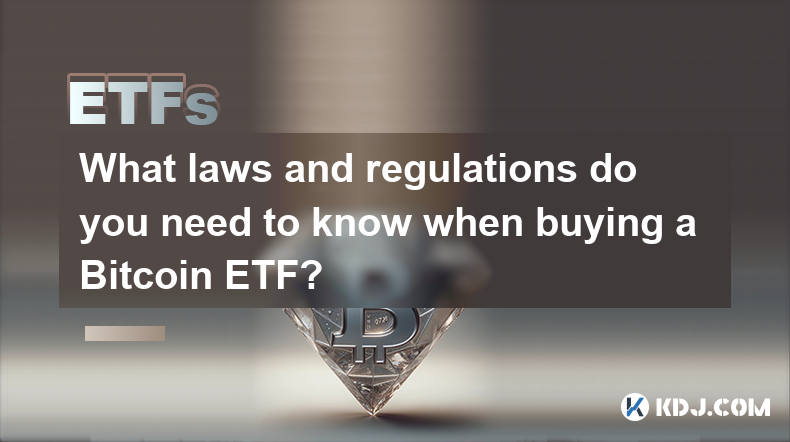
Navigating the Legal Landscape of Bitcoin ETF Investments
Investing in a Bitcoin ETF, while seemingly straightforward, involves understanding a complex web of laws and regulations. These regulations vary significantly depending on your jurisdiction and the specific ETF you're considering. This article aims to clarify some of the key legal considerations.
First, it's crucial to understand that Bitcoin ETFs are not yet widely available in all markets. The regulatory approval process for these products is stringent and varies considerably across different countries. Before investing, you must confirm whether the ETF you intend to purchase is legally available and registered in your region. This often involves checking with your local securities regulator.
Secondly, tax implications are a major concern. The tax treatment of Bitcoin ETF gains and losses will depend on your country's tax laws and the holding period of your investment. Capital gains taxes may apply upon the sale of your ETF shares, and these rates can vary substantially. It's strongly recommended to consult a tax professional familiar with cryptocurrency taxation to understand your specific obligations. Failing to do so could result in significant penalties.
Thirdly, know your broker and exchange. Not all brokerage firms or exchanges offer Bitcoin ETFs. Before investing, verify that your chosen platform supports the specific ETF you are interested in. Ensure the platform is reputable and regulated in your jurisdiction to minimize risks associated with fraud or security breaches. Checking the platform's security measures and regulatory compliance is essential.
Fourthly, understand the prospectus. Before investing in any ETF, carefully review the prospectus. This document provides crucial information about the ETF's investment strategy, fees, risks, and other important details. Pay close attention to the sections detailing the ETF's exposure to Bitcoin and the risks associated with holding Bitcoin. Ignoring this crucial step could lead to unforeseen financial losses.
Fifthly, consider the risks associated with Bitcoin itself. Bitcoin's price is notoriously volatile, and a Bitcoin ETF will be subject to similar price fluctuations. The value of your investment can significantly increase or decrease in a short period. Understand your risk tolerance before committing your capital. Remember that past performance is not indicative of future results.
Understanding the Regulatory Approval Process
The regulatory approval process for Bitcoin ETFs is a complex and often lengthy procedure. It usually involves multiple stages and rigorous scrutiny by regulatory bodies.
- Application submission: The ETF issuer must submit a comprehensive application to the relevant regulatory authority, providing detailed information about the ETF's investment strategy, risk management, and compliance procedures.
- Review and assessment: The regulatory authority reviews the application thoroughly, assessing the ETF's compliance with all relevant laws and regulations. This often involves examining the ETF's custodianship arrangements, market surveillance mechanisms, and investor protection measures.
- Public comment period: In some jurisdictions, a public comment period may be included, allowing interested parties to submit their views on the proposed ETF.
- Approval or rejection: After a comprehensive review, the regulatory authority decides whether to approve or reject the application. Approval is not guaranteed, and rejection may occur if the ETF fails to meet the regulatory standards.
Investment Strategies and Risk Management
Investing in a Bitcoin ETF requires a well-defined investment strategy and a thorough understanding of the associated risks.
- Diversification: Consider diversifying your portfolio to mitigate the risks associated with Bitcoin's volatility. Don't put all your eggs in one basket, even if it's a seemingly promising ETF.
- Risk tolerance: Assess your risk tolerance before investing in a Bitcoin ETF. Bitcoin's price can fluctuate dramatically, and you should only invest an amount you can afford to lose.
- Long-term perspective: Consider a long-term investment horizon to potentially mitigate the impact of short-term price volatility. Short-term trading in Bitcoin ETFs can be highly risky.
- Professional advice: Seek professional financial advice from a qualified advisor before making any investment decisions. They can help you develop a personalized investment strategy tailored to your financial goals and risk tolerance.
Jurisdictional Differences
The regulatory landscape for Bitcoin ETFs varies significantly across different jurisdictions. For instance, the regulatory framework in the United States differs significantly from that in Europe or Asia.
- SEC regulations in the US: The Securities and Exchange Commission (SEC) in the United States plays a crucial role in regulating Bitcoin ETFs. The SEC's approval is required before a Bitcoin ETF can be listed on US exchanges.
- European regulations: European Union regulations on crypto assets are still evolving, and the regulatory landscape for Bitcoin ETFs in Europe is complex and varies across different member states.
- Asian regulations: Regulatory approaches to Bitcoin ETFs vary significantly across Asian countries, with some countries adopting a more restrictive approach than others.
Common Questions and Answers
Q: Are Bitcoin ETFs legal in my country?
A: The legality of Bitcoin ETFs varies significantly by country. You must check with your local securities regulator to determine whether Bitcoin ETFs are legally available and registered in your region.
Q: What are the tax implications of investing in a Bitcoin ETF?
A: The tax implications depend on your country's tax laws and the holding period of your investment. Capital gains taxes may apply upon the sale of your ETF shares. Consult a tax professional for personalized advice.
Q: What are the risks involved in investing in a Bitcoin ETF?
A: Bitcoin's price volatility is a major risk. The value of your investment can fluctuate significantly. Other risks include regulatory uncertainty, security breaches, and counterparty risk.
Q: How do I choose a reputable broker for Bitcoin ETFs?
A: Choose a broker that is regulated in your jurisdiction and has a strong track record of security and compliance. Check reviews and ratings before investing. Consider factors like fees, security measures, and customer service.
Q: Where can I find the prospectus for a Bitcoin ETF?
A: The prospectus is usually available on the ETF issuer's website or the website of the exchange where the ETF is listed. It's a crucial document containing essential information about the ETF.
Disclaimer:info@kdj.com
The information provided is not trading advice. kdj.com does not assume any responsibility for any investments made based on the information provided in this article. Cryptocurrencies are highly volatile and it is highly recommended that you invest with caution after thorough research!
If you believe that the content used on this website infringes your copyright, please contact us immediately (info@kdj.com) and we will delete it promptly.
- Crypto Bull Run Expert Prediction: Navigating the Generational Surge
- 2025-06-20 08:25:12
- Peter Schiff's Stablecoin Stance: Gold vs. Fiat in the Crypto Age
- 2025-06-20 08:25:12
- Wyoming Stable Token (WYST): Sei Network Emerges as a Frontrunner
- 2025-06-20 08:45:12
- Semler Scientific's Bitcoin Bet: From Healthcare Tech to Largest Holder?
- 2025-06-20 08:45:12
- Bitcoin's Balancing Act: Demand, Selling Pressure, and the Road Ahead
- 2025-06-20 08:50:12
- Bitcoin Strategy: Semler Scientific's Bold 105,000 BTC Target and the Corporate Rush
- 2025-06-20 08:37:06
Related knowledge

Bitcoin ETF Fixed Investment Strategy: Investment Plan Suitable for Novices
Jun 19,2025 at 02:49pm
What Is a Bitcoin ETF Fixed Investment Strategy?A Bitcoin ETF (Exchange-Traded Fund) fixed investment strategy refers to the method of regularly investing a set amount of money into a Bitcoin ETF, regardless of market conditions. This approach is ideal for beginners who want exposure to Bitcoin without the need for active trading or market timing. By co...
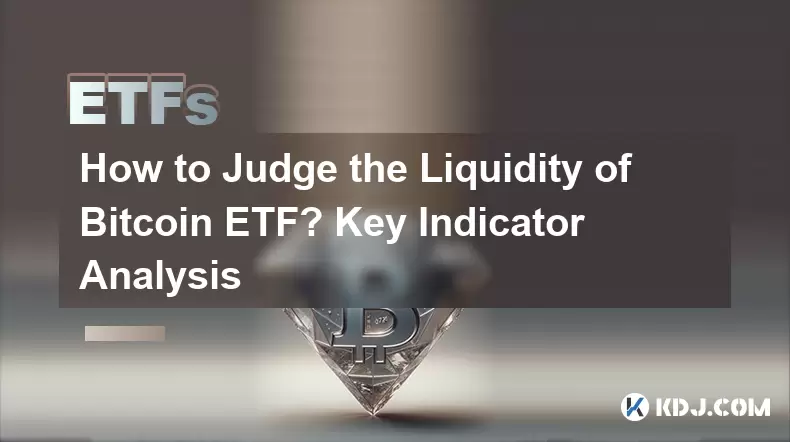
How to Judge the Liquidity of Bitcoin ETF? Key Indicator Analysis
Jun 19,2025 at 02:22pm
Understanding Bitcoin ETF LiquidityThe liquidity of a Bitcoin Exchange-Traded Fund (ETF) refers to how easily the fund can be bought or sold in the market without significantly affecting its price. For investors, understanding this concept is crucial because it directly impacts the ease with which they can enter or exit positions and influences transact...
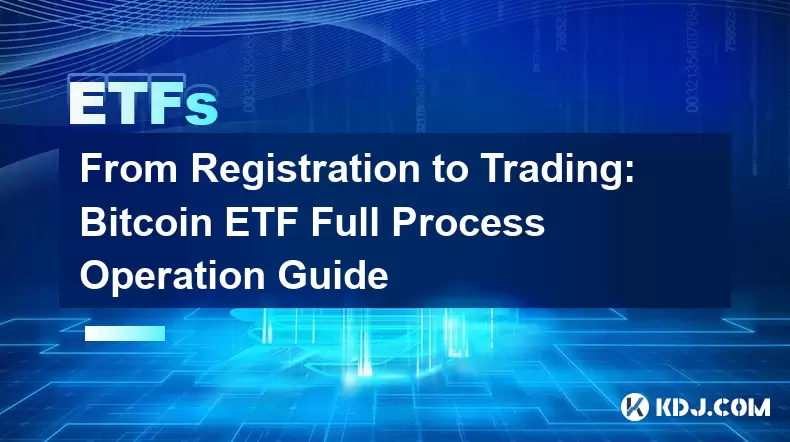
From Registration to Trading: Bitcoin ETF Full Process Operation Guide
Jun 20,2025 at 07:35am
Understanding Bitcoin ETFs: What They Are and Why They MatterA Bitcoin Exchange-Traded Fund (ETF) is a type of investment fund that tracks the price of Bitcoin and is traded on traditional stock exchanges. Unlike directly purchasing Bitcoin through a cryptocurrency exchange, an ETF allows investors to gain exposure to Bitcoin without the complexities of...
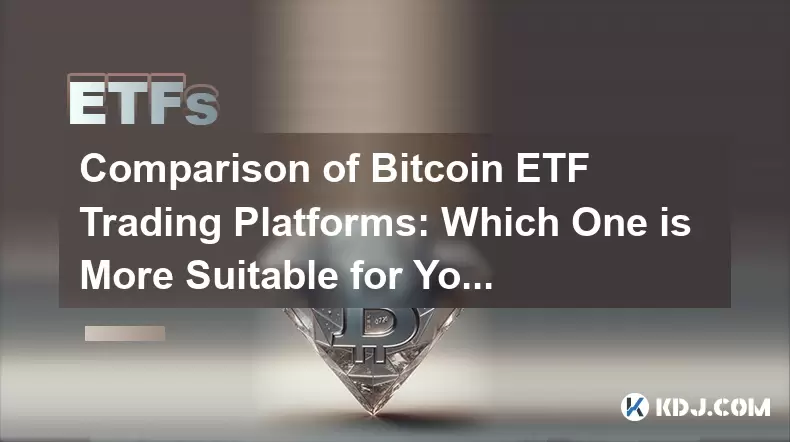
Comparison of Bitcoin ETF Trading Platforms: Which One is More Suitable for You?
Jun 20,2025 at 01:15am
Understanding Bitcoin ETFs and Their PopularityBitcoin Exchange-Traded Funds (ETFs) have gained significant traction among traditional and crypto-savvy investors. These financial instruments allow individuals to gain exposure to Bitcoin's price movements without directly owning the cryptocurrency. Bitcoin ETFs are traded on conventional stock exchanges,...
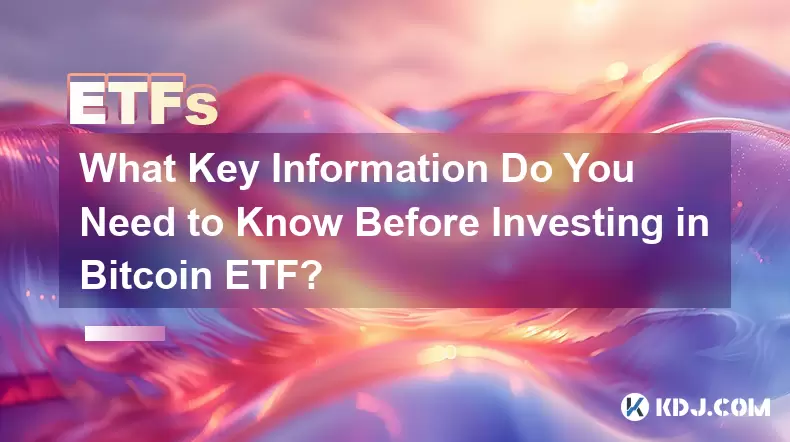
What Key Information Do You Need to Know Before Investing in Bitcoin ETF?
Jun 19,2025 at 01:15pm
Understanding Bitcoin ETFs and Their Role in the MarketA Bitcoin Exchange-Traded Fund (ETF) is a financial product that tracks the price of Bitcoin without requiring investors to directly own the cryptocurrency. These funds are traded on traditional stock exchanges, making them accessible to a broader range of investors who may not be familiar with digi...

How to Invest in Bitcoin ETF Safely? Complete Process and Precautions
Jun 19,2025 at 07:49pm
Understanding Bitcoin ETF and Its Role in InvestmentA Bitcoin Exchange-Traded Fund (ETF) is a financial product that allows investors to gain exposure to Bitcoin without directly owning the cryptocurrency. It functions similarly to traditional ETFs, which track stock indices or commodities like gold. The primary advantage of investing in a Bitcoin ETF i...

Bitcoin ETF Fixed Investment Strategy: Investment Plan Suitable for Novices
Jun 19,2025 at 02:49pm
What Is a Bitcoin ETF Fixed Investment Strategy?A Bitcoin ETF (Exchange-Traded Fund) fixed investment strategy refers to the method of regularly investing a set amount of money into a Bitcoin ETF, regardless of market conditions. This approach is ideal for beginners who want exposure to Bitcoin without the need for active trading or market timing. By co...

How to Judge the Liquidity of Bitcoin ETF? Key Indicator Analysis
Jun 19,2025 at 02:22pm
Understanding Bitcoin ETF LiquidityThe liquidity of a Bitcoin Exchange-Traded Fund (ETF) refers to how easily the fund can be bought or sold in the market without significantly affecting its price. For investors, understanding this concept is crucial because it directly impacts the ease with which they can enter or exit positions and influences transact...

From Registration to Trading: Bitcoin ETF Full Process Operation Guide
Jun 20,2025 at 07:35am
Understanding Bitcoin ETFs: What They Are and Why They MatterA Bitcoin Exchange-Traded Fund (ETF) is a type of investment fund that tracks the price of Bitcoin and is traded on traditional stock exchanges. Unlike directly purchasing Bitcoin through a cryptocurrency exchange, an ETF allows investors to gain exposure to Bitcoin without the complexities of...

Comparison of Bitcoin ETF Trading Platforms: Which One is More Suitable for You?
Jun 20,2025 at 01:15am
Understanding Bitcoin ETFs and Their PopularityBitcoin Exchange-Traded Funds (ETFs) have gained significant traction among traditional and crypto-savvy investors. These financial instruments allow individuals to gain exposure to Bitcoin's price movements without directly owning the cryptocurrency. Bitcoin ETFs are traded on conventional stock exchanges,...

What Key Information Do You Need to Know Before Investing in Bitcoin ETF?
Jun 19,2025 at 01:15pm
Understanding Bitcoin ETFs and Their Role in the MarketA Bitcoin Exchange-Traded Fund (ETF) is a financial product that tracks the price of Bitcoin without requiring investors to directly own the cryptocurrency. These funds are traded on traditional stock exchanges, making them accessible to a broader range of investors who may not be familiar with digi...

How to Invest in Bitcoin ETF Safely? Complete Process and Precautions
Jun 19,2025 at 07:49pm
Understanding Bitcoin ETF and Its Role in InvestmentA Bitcoin Exchange-Traded Fund (ETF) is a financial product that allows investors to gain exposure to Bitcoin without directly owning the cryptocurrency. It functions similarly to traditional ETFs, which track stock indices or commodities like gold. The primary advantage of investing in a Bitcoin ETF i...
See all articles

























































































